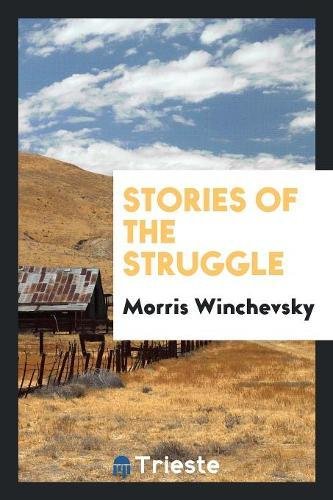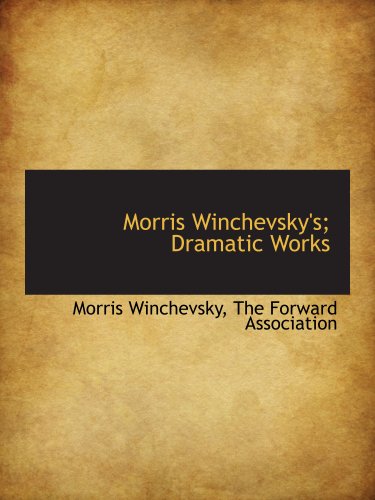Background
Morris Winchevsky was born on August 9, 1856, in Yanovo, Lithuania, the son of Sissel Novachovitch.



(Trieste Publishing has a massive catalogue of classic boo...)
Trieste Publishing has a massive catalogue of classic book titles. Our aim is to provide readers with the highest quality reproductions of fiction and non-fiction literature that has stood the test of time. The many thousands of books in our collection have been sourced from libraries and private collections around the world.The titles that Trieste Publishing has chosen to be part of the collection have been scanned to simulate the original. Our readers see the books the same way that their first readers did decades or a hundred or more years ago. Books from that period are often spoiled by imperfections that did not exist in the original. Imperfections could be in the form of blurred text, photographs, or missing pages. It is highly unlikely that this would occur with one of our books. Our extensive quality control ensures that the readers of Trieste Publishing's books will be delighted with their purchase. Our staff has thoroughly reviewed every page of all the books in the collection, repairing, or if necessary, rejecting titles that are not of the highest quality. This process ensures that the reader of one of Trieste Publishing's titles receives a volume that faithfully reproduces the original, and to the maximum degree possible, gives them the experience of owning the original work.We pride ourselves on not only creating a pathway to an extensive reservoir of books of the finest quality, but also providing value to every one of our readers. Generally, Trieste books are purchased singly - on demand, however they may also be purchased in bulk. Readers interested in bulk purchases are invited to contact us directly to enquire about our tailored bulk rates.
https://www.amazon.com/Stories-Struggle-Morris-Winchevsky/dp/0649503783?SubscriptionId=AKIAJRRWTH346WSPOAFQ&tag=prabook-20&linkCode=sp1&camp=2025&creative=165953&creativeASIN=0649503783

(This book an EXACT reproduction of the original book publ...)
This book an EXACT reproduction of the original book published before 1923. This IS NOT an OCR?d book with strange characters, introduced typographical errors, and jumbled words. This book may have occasional imperfections such as missing or blurred pages, poor pictures, errant marks, etc. that were either part of the original artifact, or were introduced by the scanning process. We believe this work is culturally important, and despite the imperfections, have elected to bring it back into print as part of our continuing commitment to the preservation of printed works worldwide. We appreciate your understanding of the imperfections in the preservation process, and hope you enjoy this valuable book.
https://www.amazon.com/Morris-Winchevskys-Dramatic-Works-Yiddish/dp/1140454080?SubscriptionId=AKIAJRRWTH346WSPOAFQ&tag=prabook-20&linkCode=sp1&camp=2025&creative=165953&creativeASIN=1140454080

(This is a pre-1923 historical reproduction that was curat...)
This is a pre-1923 historical reproduction that was curated for quality. Quality assurance was conducted on each of these books in an attempt to remove books with imperfections introduced by the digitization process. Though we have made best efforts - the books may have occasional errors that do not impede the reading experience. We believe this work is culturally important and have elected to bring the book back into print as part of our continuing commitment to the preservation of printed works worldwide. This text refers to the Bibliobazaar edition.
https://www.amazon.com/Winchevskys-Writings-Philosopher-England-Yiddish/dp/1117786293?SubscriptionId=AKIAJRRWTH346WSPOAFQ&tag=prabook-20&linkCode=sp1&camp=2025&creative=165953&creativeASIN=1117786293
Morris Winchevsky was born on August 9, 1856, in Yanovo, Lithuania, the son of Sissel Novachovitch.
As a child he moved with his family to Kovno, where he received a thorough Hebrew education and also attended the Russian government school. In 1870 he went to Wilna ostensibly to prepare himself for entrance into the rabbinical seminary, but instead improved his secular education, acquiring also a good knowledge of German. At this period he was already composing poems in Russian and Hebrew.
Instead of entering the seminary he accepted a position in a commercial firm in Kovno. Sent by his firm to the city of Oryol (Central Russia) in 1875, he became acquainted with the Russian radical and socialist literature of the time. When in 1877 his firm transferred him to Königsberg, Prussia (now Kaliningrad, Russia), he began to take an active part in socialist propaganda, the Russian-Jewish student colony and the growth of the Socialist party there providing a fertile field. He founded a Hebrew monthly, Asefath hakhamim, as a supplement to M. L. Rodkinson's Ha-kol for the dissemination of views on social questions. His Hebrew writings were mostly signed even in later years under the pen-name Ben-Nez. Upon the promulgation by the Prussian government in 1879 of the Sozialistengesetz he was arrested and spent several months in prison.
Expelled from Prussia, he went to Denmark but was again arrested in Copenhagen and released only if he would leave the country.
After a brief period in Paris, he went to London. Joining the Communist Workers' Educational Society in London which had been founded by Karl Marx and Friedrich Engels, Winchevsky began his propagandist work among the immigrant Jewish masses of the laboring classes, employing Yiddish, their mother-tongue, as his medium. Due recognition has been accorded him as the pioneer of the Yiddish socialist press and literature. In 1884 he founded the first Yiddish socialist periodical, Der Polischer Yidel, and was also the author of the first brochure on socialism in Yiddish, entitled Yehi or (1884). He was one of the founders and the chief contributor to the Arbeiter-Freund.
In 1894 he emigrated to America to take over the editorship of Emeth, a weekly family paper devoted to literature and culture. With the founding of the Yiddish daily, Forward, in 1897, he became its most representative contributor. He was also associated with many other periodicals in the rapidly growing Yiddish socialist press in the United States, and was at one time editor of the Yiddish monthly, Zukunft. He also occupies a high place in Yiddish literature as poet and writer. Although he frequently depicts Jewish life in his writings, it is characteristic of him that the Jew is but an accident of his theme. The language is Yiddish; everything else is universal. The freeing of society from the yoke of oppression is the burden of his songs. His poems, heartfelt, touching, with a true lyric quality, present the dark and sordid aspects of the life of the laborer. His socialistic bias is pronounced, but the pictures he portrays are true to life, though somewhat cold in coloring. As a man of high culture, conversant with the literatures of Russia, France, Germany, England, and America, he followed closely all the rules of prosody and poetic composition. Many of his poems of labor and struggle have been sung and recited not only in England and America but later also in Soviet Russia, because of the deep love and sympathy they display for the worker and the exploited.
When in 1924 he traveled throughout Russia as a guest of the Soviet government he was everywhere acclaimed, and a collection of his proletarian poems, Kamps-Gesangen, was published in Minsk in his honor. He was equally effective in his prose. His Yiddish style is smooth, idiomatic, and carefully balanced. Particularly fascinating were his epigrams, his philosophical reflections, and the satirical sketches which he ascribes to the Meshugener philosoph. He also translated into Yiddish a number of works from European authors, including Ibsen, Korolenko, and Victor Hugo. A revised edition of his collected works in ten volumes was published in New York, 1927 - 1928, under the editorship of Kalman Marmor.
Morris Winchevsky died on March 18, 1932, in New York.
Morris Winchevsky was an outstanding poet and socialist leader, who is well known for his role in the development of Yiddish poetry. A collection of his proletarian poems, Kamps-Gesangen, was published in Minsk in his honor. A "secular humanist" Jewish Sunday school in Toronto, Ontario was named after Winchevsky. The Morris Winchevsky School (founded in 1928) was also named after him.
(This book an EXACT reproduction of the original book publ...)
(This is a pre-1923 historical reproduction that was curat...)
(Trieste Publishing has a massive catalogue of classic boo...)
Morris Winchevsky was a member of the Proletarian Poets, an association formed with Winchevsky, Morris Rosenfeld, David Edelstadt and Joseph Bovshover.
